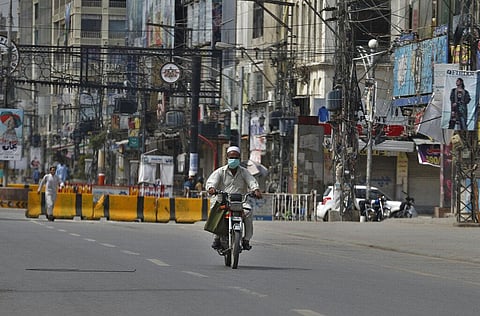

ISLAMABAD: Pakistan Prime Minister Imran Khan on Tuesday announced a multi-billion stimulus package to combat the deadly coronavirus and to facilitate poor people in the prevailing circumstances as the country's COVID-19 cases rose to 956.
The government also suspended all passenger train operations through the country till March 31 and deployed the army to assist the civil administration to enforce a nationwide lockdown to contain the virus outbreak.
In a wide-ranging interaction with journalists, Khan came under huge criticism for delaying actions to counter the disease but he answered all questions with patience while defending his government actions.
Khan said 200 billion rupees have been allocated for the labor class to mitigate their sufferings, while the government is also reaching provinces and the business community to extend their assistance.
He said the government was highly conscious of its responsibilities and it was due to various policies and steps that the coronavirus was still contained.
Khan said that the "situation is in a flux and all options are on the table, including curfew if needed."
"Curfew is the last stage of lockdown; I am so much concerned about the downtrodden segment of the society as to how would they meet their ends during curfew," he said.
Prime Minister Khan said exports and industry are vital for the economy and 100 billion rupees have been reserved for the release of tax refund immediately.
He said the industry will also be entitled to deferred interest payments.
Khan said 100 million rupees have been allocated for Small and Medium Enterprises and agriculture sectors, along with deferment of interest payments, and concessional loan facility.
He said 150 billion rupees have been reserved for poor families across Pakistan under which every family will get the assistance of three thousand rupees on a monthly basis.
Khan also announced to reduce petrol prices by 15 rupees per lire to ease the economic burden.
He said Rs 50 billion will be provided to government-run utility stores to maintain prices of essential commodities.
Another Rs 280 billion will be allocated to procure wheat to stabilize food reserves.
Khan rejected the impression that there was a communication gap between the center and the province and insisted that provinces had powers to take a decision as per their needs to control the virus.
He said the fight against the coronavirus was not a "T-20 match and this crisis may continue for six or seven months."
However, the Pakistani nation was capable to tackle it. He also warned of unrest if bad and hastily decision were taken.
"Chaos is more dangerous than coronavirus. If we take any decision in haste, it will have dire impact on the society," said the prime minister.
Khan said that the government was setting up a team of volunteers to distribute food items to the poor if curfew was imposed.
To a question, Khan said that he was in the driving seat and taking all decisions but after consultations with all stakeholders.
Meanwhile, Punjab province on Tuesday reported its first coronavirus death, bringing the total number of deaths in the country to seven.
The deceased was identified as a 57-year-old patient who was under treatment at Mayo Hospital in Lahore, provincial health department official Qaiser Asif.
Punjab has reported 16 new cases, taking the provincial tally to 265, Asif added.
Of the total 956 cases reported till Tuesday, worst-hit Sindh province accounted for with 407 cases, Balochistan 110, Khyber-Pakhtunkhwa 78, Islamabad 15 and Pakistan-occupied Kashmir 81.
Pakistan Railways on Tuesday suspended the operations of all passenger trains until March 31 due to the virus outbreak.
Passengers will be accommodated after the service resumes, according to a notification by the department.
Earlier, Leader of the Opposition in the National Assembly and PML-N President Shehbaz Sharif urged Prime Minister Khan to take drastic steps to contain the spread of the virus and tackle its financial impact on the economy and the poor people.
Shehbaz, who returned from London over the weekend after four months, urged the government to reduce interest rates by 3-4 percent, give monthly stipends to poor people, double salaries of doctors and paramedics, reduce oil prices and cooperate with opposition to control the threat.
"The reduction in interest rates will provide around Rs 80 billion to the government which it can use to deal with the coronavirus," he said in his first presser via video since returning from London.
On Monday, the Pakistan Army deployed its "all available troops and medical resources" across the country to assist the civil administration to enforce the nationwide lockdown and perform other duties.
"Army will assist federal and provincial governments in their respective plans to deal with COVID-19," Army spokesman Maj Gen Babar Iftikhar said.
"The task at hand is enormous and very difficult," Iftikhar said.
He called the threat of the coronavirus one that "we haven't seen in our lifetime."
The decision to deploy army was taken as police faced problems in enforcing the strict measures to keep people indoors after all provincial governments announced complete or partial lockdown.
There was complete lockdown in Punjab, Sindh, Balochistan and Pakistan-occupied Kashmir.
Khyber-Pakhtunkhwa was observing partial lockdown.
In several cities, roads wore a deserted look as the security forces put up containers on the main roads and in lanes to block traffic.